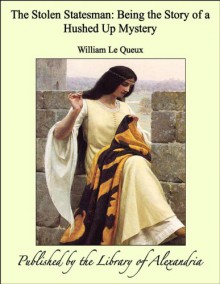Concerning Sheila Monkton. As the Right Honourable Reginald Monkton walked towards Charing Cross on that June morning his fifty-odd years appeared to weigh lightly upon him True, his hair was tinged with grey, yet that was but natural after over twenty years of political strife and Party...
show more
Concerning Sheila Monkton. As the Right Honourable Reginald Monkton walked towards Charing Cross on that June morning his fifty-odd years appeared to weigh lightly upon him True, his hair was tinged with grey, yet that was but natural after over twenty years of political strife and Party bickering, of hard-fought divisions in the House, and of campaigns of various sorts up and down the country. His career had been a brilliantly outstanding one ever since he had graduated at Cambridge. He had risen to be a Bencher of the Inner Temple; had been, among other things, Quain Professor of Law at University College, London. In Parliament he had sat for North-West Manchester for ten years, afterwards for East Huntingdon, and later for the Govan Division of Glasgow. Among other political appointments he had held was that of a Junior Lord of the Treasury, afterwards that of Parliamentary Under-Secretary to the Home Office, and now in the latest Administration he had been given the portfolio of Colonial Secretary. His one regret was that while he loved the country, and more especially Fydinge, that fine old Elizabethan manor house in Leicestershire, not far from Melton Mowbray, yet he was compelled to live in London and endure the fevered political and social life of the metropolis. That morning, as he turned from Charing Cross towards Pall Mall, he was in a pensive mood. True, that little knot of people had spontaneously expressed their approval, and perhaps he was secretly gratified. Whatever popular men may say to the contrary, it is always the small appreciations that please. Reginald Monkton was far more gratified by a schoolgirl asking for his autograph in her well-thumbed album, than by the roars of applause that greeted his open and fearless speeches in the huge halls of Manchester, Birmingham, or Glasgow. The millions of Britain knew him. His portrait appeared regularly in the illustrated papers, sometimes in declamatory attitude with his mouth open, his right fist in the palm of his left hand, addressing a great audience. But that morning, as he passed the “Senior”—as the United Service Club is known to officialdom—his thoughts were serious. He had tasted most of the sweets of life, and all the delights of popularity. Yet that day, the eighth of June, was the fourth anniversary of the death of Sheila, his beloved wife, the fine, self-sacrificing helpmate of his early days, the woman who had moulded his career and seen him through many hours of disappointment and tribulation, and who, with her woman’s amazing intuition and tact, had at the crisis of his life given him that sound advice which had swept him high upon the crest of the wave of popularity
show less

